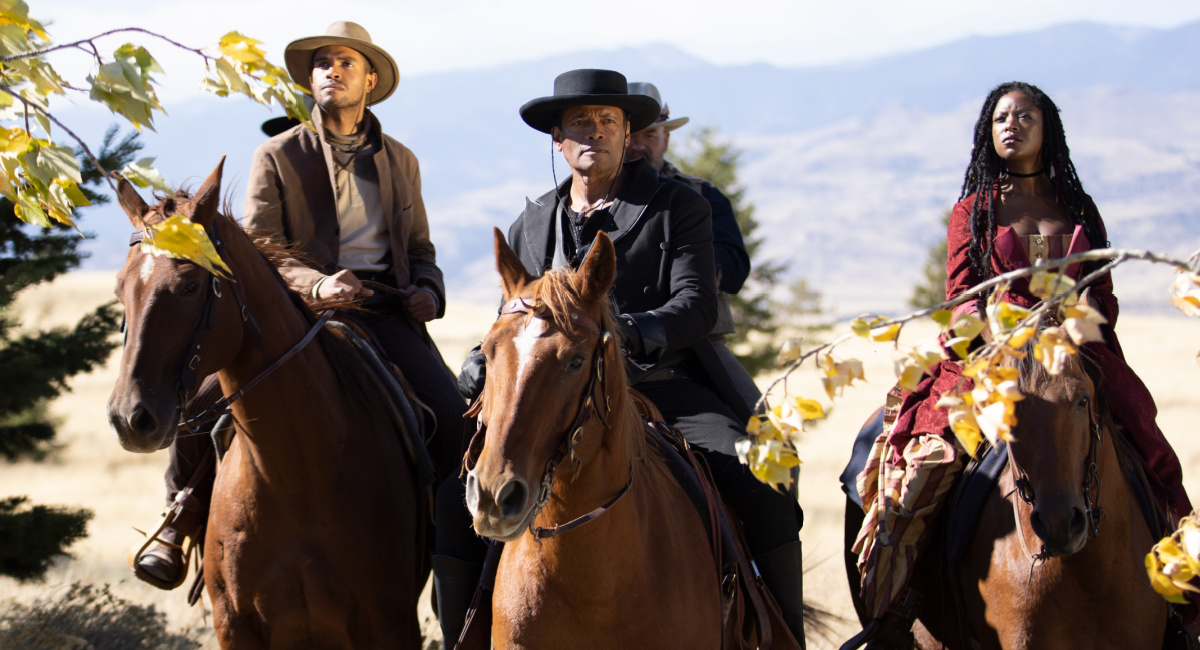As Hollywood seems ready to go gah-gah for Kevin Costner’s Old West epic Horizon: An American Saga, it has already forgotten the strength of the genre in recent years has been diversity. More stories are being told that capture what the Western experience looked like from the perspectives of Black people and Indigenous tribes, and not just white gunslingers and outlaws. Mario Van Peebles was a forebearer of this movement in 1993 with Posse, a brash, relentless film that has become a cult classic. Fans of Peebles might hope he has recaptured old glory with its spiritual successor, Outlaw Posse, but what they’ll instead find is this dusty oater is shooting a lot of blanks.
Nobody goes into a Peebles film expecting the same level of polish that a big Costner movie might have. In most cases, Peebles is able to get around budgetary shortfalls by presenting a compelling story twists expectations of the genre into knots. Westerns have never been known for their cultural diversity or fair treatment towards minority groups, or women for that matter. So Peebles puts those affected groups into the saddle and arms them to the teeth. But Posse is pretty safe and formulaic by Peebles standards, and much better recent movies than this (The Harder They Fall, Outlaw Johnny Black) have already blasted holes into the well-worn messages he wants to send.
Peebles not only wrote and directed Outlaw Posse, but he stars as Chief, a notorious outlaw in 1908 who has returned from hiding out in Mexico to find a lost cache of reparations gold. However, he’s got his villainous rival, Angel (William Mapother) on his trail. Worse, Angel has kidnapped the harp-playing wife of Chief’s son, Decker (played by Mario’s talented real-life son Mandela), to blackmail him into infiltrating Chief’s band of Merry Men.
All of this is surface-level stuff, odd for a movie that is also badly overwritten. We learn next to nothing about the grudge between Chief and Angel, although we can assume it has to do with the latter only having one hand. Nor do we know much about the estrangement between Chief and Decker, and it doesn’t take much for them to be riding the trails together. Peebles struggles to make these characters compelling and instead loads them up with too much dialogue meant to make a point rather than be as slickly entertaining as we want them to be.
An example: the film opens with a trio of thinly-veiled racists played by Neal McDonough, Cam Gigandet, and M. Emmet Walsh, just three of the many familiar faces Peebles called on to make appearances. As they enter the “shithole” town’s bar, they berate a Native American man and are ready to humiliate him further until Chief, hat perfectly tipped downwards and sitting in shadow, makes his presence felt. He instead humiliates the bigots both verbally and then with some extreme prejudice of his own, but not before rambling to such a degree that the moment lost all of its edge. Peebles has always had a problem over-directing his films (yes, even New Jack City which I love), doing too much when a little would be twice as effective.
For such a simple Western story, Outlaw Posse is strangely convoluted and scattershot. But it still holds a few charms. For fans of Peebles, and I am definitely one, it made me smile to see Mario have such a full-circle moment working with his son Mandela the way he used to work under his legendary father, Melvin Van Peebles. Also, the supporting cast is quite a lot of fun. Whoopi Goldberg straps up to play real-life rifle-bearing mailcarrier, Stagecoach Mary. It’s a shame she and other Black historical figures are pushed to the side when their stories could’ve been elevated. Comedian DC Young Fly also makes an impression as Spooky, a Vaudeville actor who uses humor to escape from potentially deadly situations. Amber Reign Smith plays the blade-wielding Queenie, a love interest and partner-in-crime for Chief. And I thought there was a better story to tell with Cedric the Entertainer’s character, Horatio, who runs a town that uses an economic system that puts everyone on a level playing field, a foreign concept at a time when such things can be dangerous.
But Outlaw Posse largely sticks within a narrow Western framework, and doesn’t have the brazen, in-your-face energy of Peebles’ prior films, particularly in this genre. He remains a pivotal voice in the realm of indie film and African-American cinema, and knowing Peebles’ work, he’ll be back in the saddle and hitting his stride again soon.
Outlaw Posse opens on March 1st.
